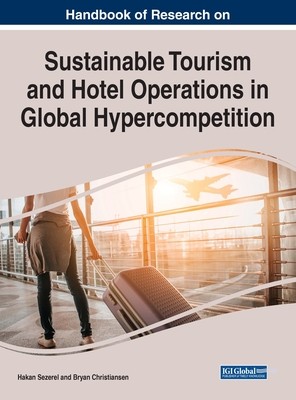
- We will send in 10–14 business days.
- Publisher: IGI Global
- Year: 2022
- ISBN-10: 1668446456
- ISBN-13: 9781668446454
- Format: 21.6 x 27.9 x 3.8 cm, hardcover
- Language: English
- SAVE -10% with code: EXTRA
Handbook of Research on Sustainable Tourism and Hotel Operations in Global Hypercompetition (e-book) (used book) | bookbook.eu
Reviews
Description
To compete effectively today and remain sustainable over the long term, business organizations must create flexible means of generating competitive advantage given the hypercompetitive nature of the global marketplace in all industries including tourism. The COVID-19 pandemic has exacerbated the situation, thus requiring the tourism industry to reassess itself and realign operations with global and local realities. The Handbook of Research on Sustainable Tourism and Hotel Operations in Global Hypercompetition examines various aspects of the hospitality, recreation, and tourism industries. It contributes empirical research, theoretical development, and current best practices to the field. Covering topics such as sustainable medical tourism, technology acceptance model, and cultural tourism, this major reference work is an essential resource for community leaders, business executives and managers, government officials, librarians, students and faculty of higher education, researchers, and academicians.
EXTRA 10 % discount with code: EXTRA
The promotion ends in 20d.16:44:18
The discount code is valid when purchasing from 10 €. Discounts do not stack.
- Publisher: IGI Global
- Year: 2022
- ISBN-10: 1668446456
- ISBN-13: 9781668446454
- Format: 21.6 x 27.9 x 3.8 cm, hardcover
- Language: English English
To compete effectively today and remain sustainable over the long term, business organizations must create flexible means of generating competitive advantage given the hypercompetitive nature of the global marketplace in all industries including tourism. The COVID-19 pandemic has exacerbated the situation, thus requiring the tourism industry to reassess itself and realign operations with global and local realities. The Handbook of Research on Sustainable Tourism and Hotel Operations in Global Hypercompetition examines various aspects of the hospitality, recreation, and tourism industries. It contributes empirical research, theoretical development, and current best practices to the field. Covering topics such as sustainable medical tourism, technology acceptance model, and cultural tourism, this major reference work is an essential resource for community leaders, business executives and managers, government officials, librarians, students and faculty of higher education, researchers, and academicians.


Reviews